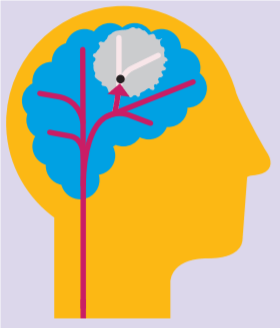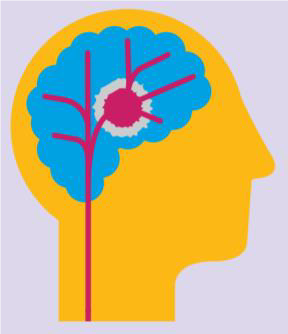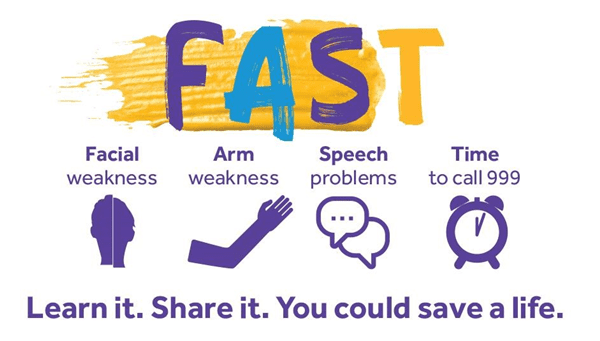Why All the Fuss About a Stroke?
We all may know someone who had a stroke – a family member, friend, colleague, sister or brother from church or neighbour. The truth is Stroke can happen to anyone, including children. In the UK, there are 100,000 strokes a year, that’s one every five minutes and there are 1.2 million stroke survivors.
Stroke is the fourth leading cause of death in the United States with 795,000 people in the U.S. suffer strokes each year and accounts for 133,000 deaths each year there are 7,000,000 stroke survivors in the U.S.
Almost two-thirds of patients who have suffered a STROKE leaves the hospital with a disability.
What is a STROKE?
A stroke occurs when the brain is attacked due to the blood flow and oxygen supply being cut off to part to the brain. Without blood and oxygen, your brain cells can be damaged or die.
85% of Stroke is caused by a blockage

15% of Stroke is caused by a bleed

There are two types of STROKES:
1. This is called an ischaemic stroke. Most strokes are caused by a blockage, such as a clot, which cuts off the blood supply to the brain.
2. This is called a haemorrhagic stroke. This type of stroke can happen because of a bleed, caused by a burst or rapture blood vessel within or on the surface of the brain. Haemorrhagic Stroke is much more life-threatening as patient suffering this type of stroke are at a higher risk of dying within the first three months and beyond.
What People don’t know?
- 90% of strokes worldwide could be prevented!
- That stroke can be treatable!
- Who are at risk of stroke?
- What the signs and symptoms of stroke are?
- What to do if they suspect a stroke?
- What the effects of stroke are?
- What to do to reduce the risk of stroke?
- Where to get help after surviving a stroke?
Who are at risk of stroke?
Race/ethnicity –
- African, Caribbean and African Americans have almost two times the risk of white American and European people of having a first stroke.
- Hispanics, Hispanic Americans and American Indians are at greater risk than whites are for having a stroke but are at less risk than African Americans.
- African Americans and Hispanics are more likely than whites to die after having a stroke.
Age –
- Stroke risk increases with age.
- Three-quarters of strokes occur in people ages 65 and older.
Gender –
- More women than men die from stroke and the risk is higher for women due to higher life expectancy.
- Women suffer greater disability after stroke than men.
- Women ages 45 to 54 are experiencing a stroke surge, mainly due to increased risk factors and lack of prevention knowledge.
Other Risk Factors –
- Atrial fibrillation
- Hypertension
- Diabetes
- Obesity
- Smoking
- Sickle Cell Anemia
Anyone, at any Age, at any time!
What the signs and symptoms of stroke are?
- Sudden and severe headache
- Trouble seeing in one or both eyes
- Sudden dizziness
- Trouble walking
- Sudden confusion
- Trouble speaking or slurring speech
- Sudden numbness or weakness of face, arm or leg
What to do if they suspect a stroke?
Keep calm and act FAST!
F = FACE: Ask the person to smile.
A = ARM: Ask the person to raise both arms.
S = SPEECH: Ask the person to speak a simple sentence.
T = TIME: Call 999 or 112 and ask for an ambulance stating stroke. If outside the UK and Europe, learn your local emergency number and call them immediately.
Also be aware of TIA – Transient Ischemic Attack
Transient ischemic attack (TIA) is a warning sign of a future stroke – up to 40 percent of TIA patients will have a future stroke.
Symptoms of TIAs are the same as stroke. TIA symptoms can resolve within minutes or hours however it is important to seek immediate medical attention if you suspect that you are having or someone is having a TIA or have had a TIA.
What the effects of stroke are?
- People who suffer stroke may have the following impairments and disabilities.
- Memory and Thinking
- Vision
- Speech
- Swallowing
- Arm and Hand Weakness
- Bowel and Bladder Control
- Muscle and Joint Pain
- Leg Weakness and Balance
- Pins and Needles
What to do to reduce the risk of stroke?
- Know your blood pressure. Have it check regularly. If it is elevated, speak to your doctor and work to help to control it.
- Find out if you have atrial fibrillation (Afib) – a type of irregular heartbeat. If you have it, seek professional advice and support to manage it
- If you smoke, stop
- Eat a balanced diet
- Stay a healthy weight
- Cut down on alcohol
Where to get help after surviving a stroke?
In the UK if you are a survivor of stroke you are not alone. Speak you your doctor or local authority about local support groups or a really great place to start is by contacting the UK Stroke Association via their website https://www.stroke.org.uk.
The UK Stroke Association have invested over £50 million in research, leading to advances in stroke care and offer services support to 57,000 people as well as working with NHS England on a new national plan for stroke in England.
Remember 90% of strokes worldwide could be prevented!
To learn more about how to prevent stroke get in touch with us on +44 (0) 1785 532 219 or www.safeheartstraining.co.uk to a book on a Family First Aid Course the will empower you and your family with the knowledge, skills and confidence to act FAST when emergency strikes – ultimately saving lives!
#StrokeAwareness
#SafeHeartsTraining
#StrokeAssociation
#SickleCellAnemia
#FamilyFirstAid
Important web links
https://www.sicklecellsociety.org/
https://www.stroke.org.uk/
https://safeheartstraining.co.uk/







Leave a Reply
Want to join the discussion?Feel free to contribute!